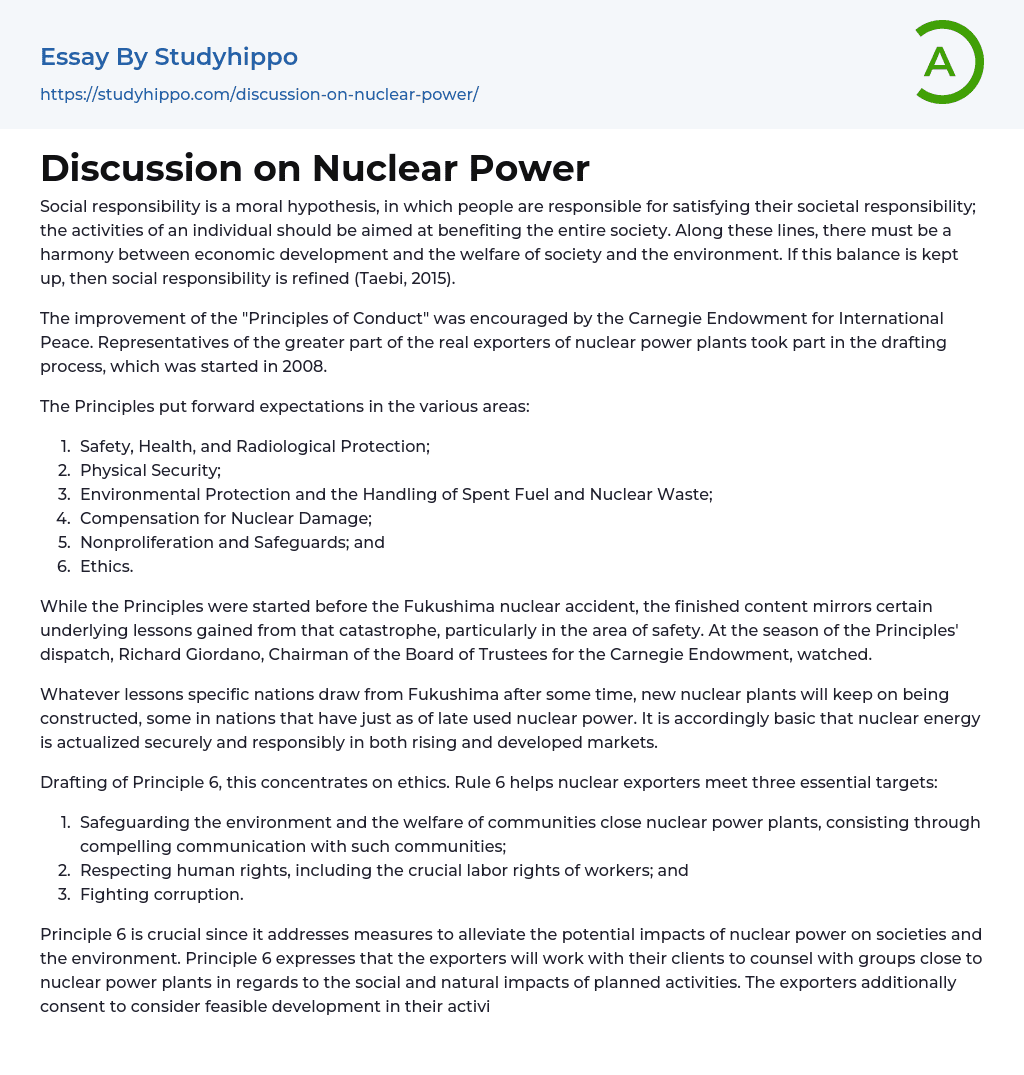Social responsibility is a moral hypothesis, in which people are responsible for satisfying their societal responsibility; the activities of an individual should be aimed at benefiting the entire society. Along these lines, there must be a harmony between economic development and the welfare of society and the environment. If this balance is kept up, then social responsibility is refined (Taebi, 2015).
The improvement of the "Principles of Conduct" was encouraged by the Carnegie Endowment for International Peace. Representatives of the greater part of the real exporters of nuclear power plants took part in the drafting process, which was started in 2008.
The Principles put forward expectations in the various areas:
- Safety, Health, and Radiological Protection;
- Physical Security;
- Environmental Protection and the Handling of Spent Fuel and Nuclear Waste;
- Compensation for Nuclear Damage;
- Nonproliferation and Safeguards; and
- Ethics.
>
While the Principles were started before the Fukushima nuclear accident, the finished content mirrors certain underlying lessons gained from that catastrophe, particularly in the area of safety. At the season of the Principles' dispatch, Richard Giordano, Chairman of the Board of Trustees for the Carnegie Endowment, watched.
Whatever lessons specific nations draw from Fukushima after some time, new nuclear plants will keep on being constructed, some in nations that have just as of late used nuclear power. It is accordingly basic that nuclear energy is actualized securely and responsibly in both rising and developed markets.
Drafting of Principle 6, this concentrates on ethics. Rule 6 helps nuclear exporters meet three essential targets:
- Safeguarding the environment and the welfare of communities close nuclear power plants, consisting through compelling communication with such communities;
- Respecting human rights, including the crucial labor rights of workers; and
- Fightin
corruption.
Principle 6 is crucial since it addresses measures to alleviate the potential impacts of nuclear power on societies and the environment. Principle 6 expresses that the exporters will work with their clients to counsel with groups close to nuclear power plants in regards to the social and natural impacts of planned activities. The exporters additionally consent to consider feasible development in their activities.
Principle 6 likewise expresses that the exporters will regard the essential labor rights of their clients, including the right to aggregate bargaining. They likewise vow to respect the Universal Declaration on Human Rights — a guarantee which has suggestions for their cooperations with employees, as well as with societies and different stakeholders.
At last, Principle 6 addresses the problem of corruption, which can emerge with regards to extensive infrastructure ventures. The exporters focus on having internal projects set up to get rid of corruption, and to look for proportional duties from clients.
Example
In the United States, a few rivers have been contaminated by nuclear waste, including the Snake River (Idaho), Columbia River (Washington), and Savannah River (South Carolina). Radioactive and/or dangerous substances can escape into the dirt or air through human error, careless practices, or just misfortune.
References
- Taebi, B. & Van De Poel, I. (2015). The socio-technical challenges of nuclear power production and waste management in the post-Fukushima era. Journal of Risk Research, 18(3): 267-273.
- Animal Welfare essays
- Zoo essays
- Plastic essays
- Waste Management essays
- Climate Change essays
- Global Warming essays
- Conservation essays
- Recycling essays
- Nuclear Family essays
- Air Pollution essays
- Carbon Dioxide essays
- Climate essays
- Deforestation essays
- Ecology essays
- Endangered Species essays
- Environmental Issues essays
- Environmental Protection essays
- flood essays
- Greenhouse Gas essays
- Hurricane essays
- Nature essays
- Pollution essays
- Renewable Energy essays
- Sustainability essays
- Tornado essays
- Traffic essays
- Tsunami essays
- Water Pollution essays
- Atom essays
- Big Bang Theory essays
- Density essays
- Electricity essays
- Energy essays
- Force essays
- Heat essays
- Light essays
- Motion essays
- Nuclear Power essays
- Physiology essays
- Sound essays
- Speed essays
- Temperature essays
- Thermodynamics essays




